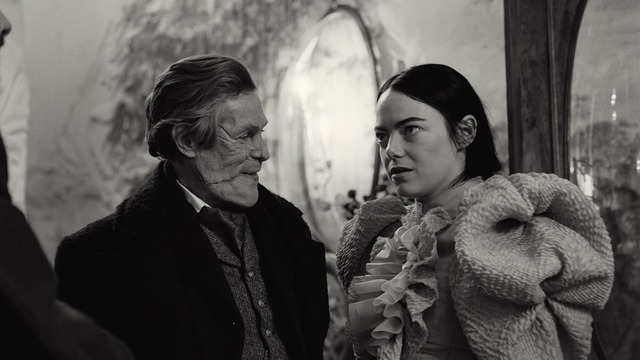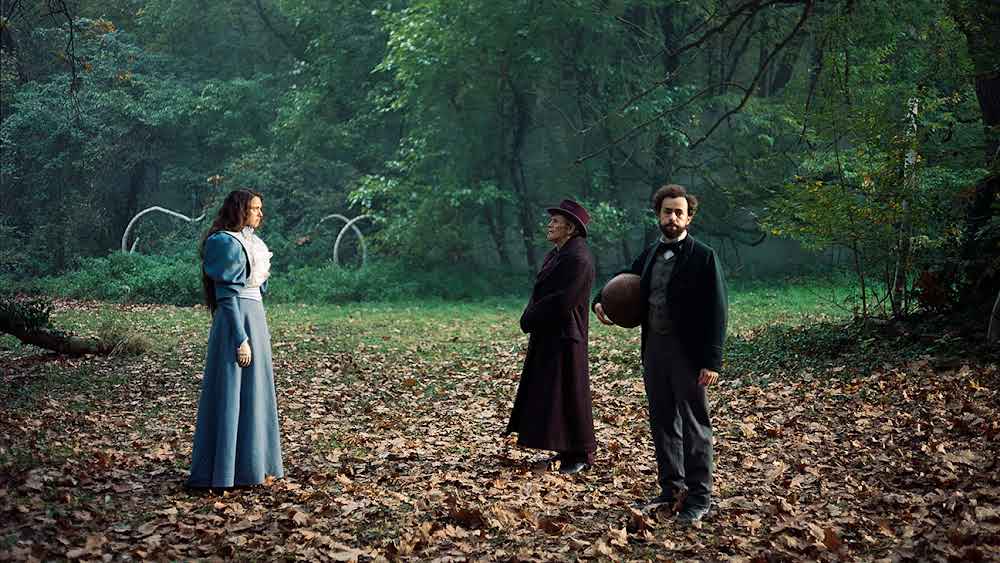Yorgos Lanthimos blossoms into a full auteur with Poor Things. Auteurs are generally thought of as directors who have a command of the tools of cinema and who tend to explore and repackage similar themes over time. Poor Things is the sort of overstuffed effort – in a good way – that confirms Lanthimos’ arrival at this august stage. In fact, the adaptation of Alasdair Gray’s 1992 novel sometimes plays like Lanthimos’ greatest hits, again not a bad thing given the sort of career he’s had in the less than 15 years since his 2009 breakout with Dogtooth. He’s even got his stable of preferred collaborators. If Colin Farrell doesn’t find a role in this one, Emma Stone does.
In fact, it’s Stone’s central character, Bella Baxter, who may be one of the poor things of the title, though that adjective can be interpreted as either of its most obvious meanings, pitiable or impecunious, depending on the juncture of this purposeful but free-flowing narrative. In a production design that often recalls the work of Heinz Edelmann, who did the artwork for the Beatles’ Yellow Submarine, Lanthimos sends us through a sort of Frankenstein coming-of-age story that itself is a Frankenstein’s monster of different forms, ideas, costumes, sets, film stocks and camera lenses. While Lanthimos’ confronting approach will certainly not please all viewers, anyone who has found themselves on his wavelength in the past should be delighted.
Bella Baxter was not the original name of the woman played by Stone. She was Victoria Blessington when she dove from a bridge in late 19th century London, meaning to end her life and the life of the unborn baby she was carrying. Victoria was reborn as Bella when she was fished from the water by Godwin Baxter (Willem Dafoe), himself a bit of a monstrosity of sewn together pieces after a childhood of extreme parental abuse. Godwin – who goes by “God” – used these formative experiences to become a brilliant surgeon and scientific mind, and he’s figured out a way to revive the recently deceased woman into Victoria’s body but with the brain of a newborn. Belatedly joining God’s scientific endeavours is medical student Max McCandles (Ramy Youssef), who becomes smitten with the preverbal Bella – a pattern destined to repeat itself among other men she meets.
One of those is Duncan Wedderburn (Mark Ruffalo), an openly devious lawyer brought in by God to draw up a contract stipulating the terms of Bella’s engagement with the world. As she has rapidly matured into an autonomous being who still has unusual ways of putting things – she refers to sex as “furious jumping” – Bella effectively allows herself to be kidnapped by Duncan for a European sojourn, from which he does not intend to return her. God and, less willingly, Max let her go to explore the world, beginning work on a new revived body (Margaret Qualley).
Did we mention that God’s estate also features hybrids of different animals who have been successfully sewn together into a new creature? This feels like Lanthimos’ The Lobster popping in to say hello. Bella’s enforced isolation from the world is the essential milieu of Dogtooth, and Poor Things even contains a taste of the bizarre dancing of the aristocrats in The Favourite. While each of those Lanthimos favourites showcased opaque messaging that viewers could interpret as they saw fit, Poor Things has the effect of being all of them at once – while also potentially containing Lanthimos’ most clear-eyed thinking yet.
As a character, Bella may be destined to become a feminist icon. She’s been created, but then chooses to create herself through her experiences. That she is the victim of men with unsavoury intentions would be the surface reading of her character, but Lanthimos’ world is just gentle enough to make Bella a full participant in whatever ways her innocence is compromised. Without going into too many details, sex work has never seemed so much the realisation of a character’s purposeful selfhood as it does in Poor Things. Bella would only be a victim of the world if she ceded control.
And what a world. Lanthimos uses black and white for most of the London scenes featuring her truly pitiable creator, Godwin Baxter. By all conventional descriptions a monster, with his various facial features reattached through what may have been self-surgery, God is a benevolent creator who truly wants to give Victoria a second chance at life. The normal functions of his body have been so compromised that he must release gas via grapefruit-sized bubbles emitted from his mouth, just one of those signature Lanthimos details that adds absurdity without explanation. As a cinematic mad scientist himself, the director obviously feels a kinship to God, as he’s the god presiding over any one of his films.
The film shifts into colour, and some truly otherworldly interpretations of familiar European cities presided over by dirigibles and other flying crafts, when Bella and Duncan make off to Europe. The heavily saturated colours may be necessary as metaphors for Stone’s performance, which shifts from poo-flinging simian to cultured sophisticate as the movie progresses, but never loses its eccentric edge. To accentuate the animal side to her character, Stone is frequently featured without clothing, a career first for the actress that indicates the depth of her trust in Lanthimos and his vision.
Her potential captor, Duncan, who hopes to possess her by acting as her gateway to a world of pleasures, is steadily revealed as not only a charlatan, but a fool. One of the joys of Poor Things is watching this creep steadily unravel as Bella, without cruelty, withdraws the things he believes he needs to survive. Ruffalo is having a hell of a time in this role and plays it to the hilt.
The other mark of Lanthimos as an auteur has been his ultimately bleak perspective on the world, on what becomes of good people when bad people have all the power. Again without saying too much about where Poor Things goes, the film shows that Lanthimos may still be uncovering new dimensions of his auteurhood. While continuing to make us laugh at his characters, but by giving agency to those who might never survive one of his past films, Lanthimos appears to be organising his ideas into a moral order comprised of wild, disorganised parts. He does this without sacrificing the multiplicity of competing notions that can be taken from Poor Things, as any good auteur should.
Poor Things is currently playing in cinemas.



